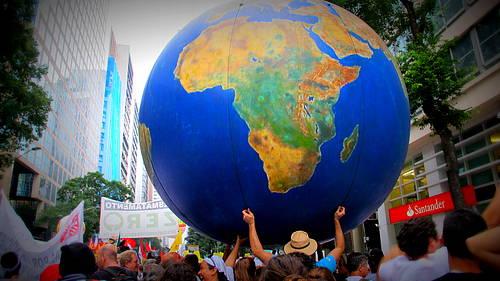Many church and civil society representatives have expressed disappointment over the lack of vision and ambition in the outcomes of the Rio+20 summit, which took place in Rio de Janeiro, Brazil, this June. Yet the affirmation of the human right to water and sanitation is one aspect among others in the results that the future work of the ecumenical movement for sustainability and eco-justice can build on.
“The outcome document of Rio+20 does not reflect the urgency of threats to life on earth as presented by the scientific community,” noted Dr Guillermo Kerber, the WCC programme executive on Care for Creation and Climate Justice when the summit in Rio de Janeiro had concluded.
“The international community, having been unable to reach a consensus, opted for the lowest common denominator, avoiding any controversial issues. As a result, the earth loses, and the poor and vulnerable lose,” added Kerber on why religious actors widely refused to accept the final document of Rio+20 as an effective instrument of change.
Yet, while affected by the general disappointment over the lack of vision and ambition in the outcomes of the Rio+20 United Nations Conference on Sustainable Development (UNCSD), ecumenical partners agreed that some positive aspects could be found among the results of the summit that could be helpful in the future work for sustainable development.
These aspects include the much debated inclusion of not only the human right to water and sanitation for which the WCC’s Ecumenical Water Network had spoken up, but also other key human rights principles.
“In the original 1992 Rio conference outcome, human rights were entirely lacking”, recalled Peter Prove, executive director of the Ecumenical Advocacy Alliance (EAA). “But this time the text is full of rights language, covering the rights to food, to health – including sexual and reproductive health, to water and sanitation, to education, to social security, labour rights and the right to development.”
“The outcome on food and agriculture issues was generally better than feared,” added Christine Campeau, the EAA Food Campaign Coordinator. She said that “explicit commitments concerning smallholder farmers, traditional seed supply systems, empowering rural women, addressing food price volatility, increased investment in sustainable agriculture and reducing post-harvest losses and food waste, as well as affirmations of the human right to food and of the role of the Committee on World Food Security - it gives us something to work with.”
“Though far from being the mine of inspiration and leverage we advocated and hoped for, there are a few ‘nuggets’ to be found when we carefully sift through the results of the summit,” agrees Isaiah Kipyegon from the ACT Alliance. “The establishment of a process to develop Sustainable Development Goals to replace the Millennium Development Goals after 2015, as well as the voluntary sustainability reporting for companies are important opportunities for the ecumenical family to engage with further.”
“There are some solid - nothing inspirational - but some solid processes, some solid decisions at Rio that we will definitely (…) be working on moving forwards,” confirms Dr Alison Doig, Christian Aid's senior advisor on Sustainable Development. As an example she referred to the UK government’s decision on making it mandatory for large companies to publish their carbon emissions.
Looking beyond the inter-governmental processes, many also felt encouraged and energized by the vibrancy of civil society initiatives that showed in the People’s Summit which ran parallel to the UNCSD summit.
“After these days of fighting next to amazing people, I am a different person,” reflected Bia Pitrofski, a participant in “Criatitude,” an educational project that encourages Lutherans and others in Latin America to use “creative attitudes” in promoting sustainability and eco-justice. “I have hope in a better world, a new world, and in living in harmony as a society and as a part of creation. I see that there is a young generation of protagonists, and we are an example of that.”
Read more:
People of faith in Rio de Janeiro show concern for the earth (WCC press release of 20 June 2012)
Rio+20 disappointment impassions youth to pursue local eco-justice (WCC feature article of 16 July 2012)
Video: “Rio+20: Justice and peace”
Rio+20 Post Summit reactions (Christian Aid on YouTube)







